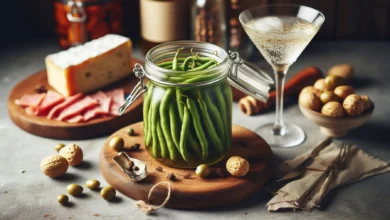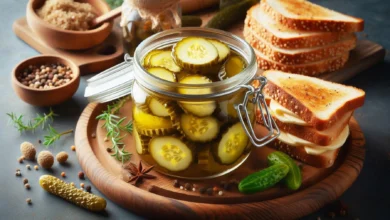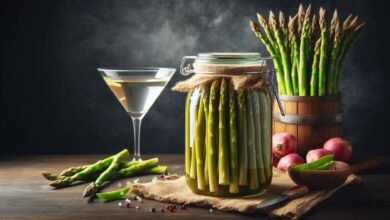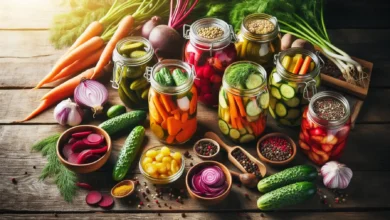Pickled Eggs Recipe: A Tangy Delight for Your Taste Buds
A Simple and Tangy Recipe for Homemade Pickled Eggs
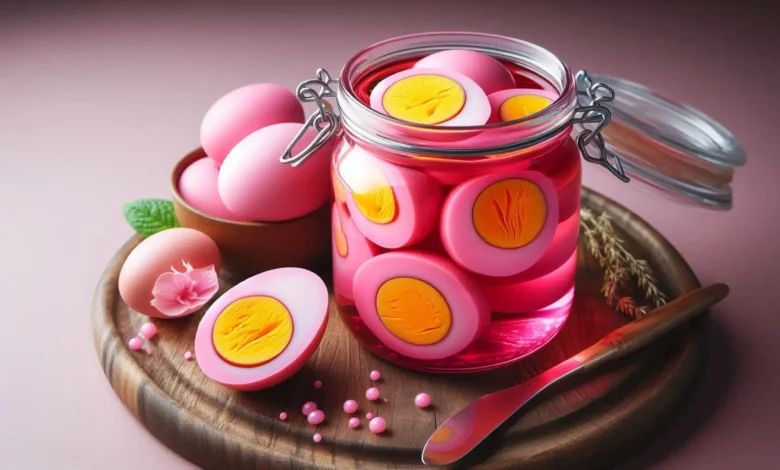
Introduction
Pickled eggs are a classic snack that combines tangy flavors with a satisfying crunch. Whether you’re hosting a party, looking for a unique snack, or wanting to try a new way to preserve eggs, this pickled egg recipe is sure to impress. Not only are they delicious, but they’re also incredibly versatile – you can tweak the flavors to suit your taste with a variety of spices and herbs.
Pickled eggs are also an excellent way to preserve eggs and add some zing to your pantry. They can be stored for weeks, allowing you to enjoy this tangy treat for an extended period. So, without further ado, let’s dive into the recipe and make some pickled eggs!
Ingredients
| Ingredient | Quantity | Notes |
|---|---|---|
| 🥚 Eggs | 12 large | Fresh eggs work best for pickling. |
| 🍶 Vinegar | 2 cups | White vinegar is commonly used, but apple cider vinegar can add a unique flavor. |
| 🧂 Salt | 2 tablespoons | Use non-iodized salt such as pickling or kosher salt for best results. |
| 🌿 Dill | 1 tablespoon | Fresh or dried dill can be used. |
| 🌶️ Red pepper flakes | 1 teaspoon | Adjust based on your heat preference. |
| 🧄 Garlic | 2 cloves | Fresh garlic cloves, smashed or left whole for a milder taste. |
| 🌱 Mustard seeds | 1 teaspoon | Optional, adds a slight tangy flavor. |
| 🍯 Sugar | 1 tablespoon | Optional, adds a slight sweetness to balance the tanginess. |
| 🧃 Water | 1 cup | To dilute the vinegar slightly. |
Instructions
- Prepare the eggs: Place the eggs in a pot and cover them with cold water. Bring the water to a boil, then reduce the heat and simmer for 10-12 minutes. Once cooked, remove the eggs and let them cool in ice-cold water or under cold running water to stop the cooking process.
- Peel the eggs: Gently tap the cooled eggs on a hard surface to crack the shells, then peel them carefully. Set the peeled eggs aside.
- Prepare the pickling brine: In a saucepan, combine the vinegar, water, salt, sugar, garlic, dill, mustard seeds, and red pepper flakes. Heat the mixture over medium heat, stirring occasionally, until the salt and sugar dissolve. Bring the brine to a simmer, then remove from heat.
- Pack the eggs: Place the peeled eggs in a clean, sterilized jar. Add any remaining garlic cloves or extra dill if you like.
- Pour the brine: Carefully pour the hot brine over the eggs, ensuring that they are fully covered with liquid. Leave a small space at the top of the jar.
- Seal the jar: Seal the jar with a lid and let it cool to room temperature. Once cooled, refrigerate the jar.
- Let the eggs pickle: For best results, let the eggs sit in the brine for at least 48 hours before eating. The longer they sit, the more flavorful they become.
Equipment Needed
- Large pot: To cook the eggs.
- Saucepan: For preparing the pickling brine.
- Sterilized jar: To store the pickled eggs.
- Lid: To seal the jar after filling it with the eggs and brine.
- Measuring spoons: For accurately measuring the salt, sugar, and spices.
- Strainer or slotted spoon: To remove the eggs from the boiling water.
Storage Tips
- Storage Duration: Pickled eggs can be stored in the refrigerator for up to 3-4 weeks. Be sure to keep them sealed in an airtight jar to maintain their freshness.
- Best Container: Use a glass jar or airtight container to preserve the flavor and prevent contamination.
- Refrigeration: Always refrigerate pickled eggs immediately after preparing them. Never leave them at room temperature for extended periods.
Variations and Substitutions
- Spicy Pickled Eggs: For a spicier version, add a few dried chili peppers or a tablespoon of hot sauce to the pickling liquid. This will give your eggs a spicy kick that pairs perfectly with their tangy flavor.
- Herb-Infused Pickled Eggs: Add fresh herbs like dill, rosemary, or thyme to the pickling liquid for an aromatic variation.
- Vinegar Options: While white vinegar is most commonly used, you can substitute it with apple cider vinegar for a milder taste or red wine vinegar for a more robust flavor.
- Sugar Alternatives: If you prefer a less sweet pickling solution, reduce or eliminate the sugar. You can also substitute it with honey or stevia for a healthier alternative.
Conclusion
Pickled eggs are a delicious and easy way to enjoy a tangy snack or garnish for your meals. With simple ingredients and minimal preparation, you can enjoy this classic treat in a variety of flavors, whether you prefer them sweet, spicy, or herbed. The versatility of pickled eggs makes them a great addition to your culinary repertoire, and they can be customized to suit any taste.
Ready to start pickling? Let us know how your pickled eggs turn out, and feel free to share your variations in the comments below! For more pickling inspiration, check out our Pickling Recipes: 30 Best Unique and Flavorful Preserves to explore more delicious preserves!

